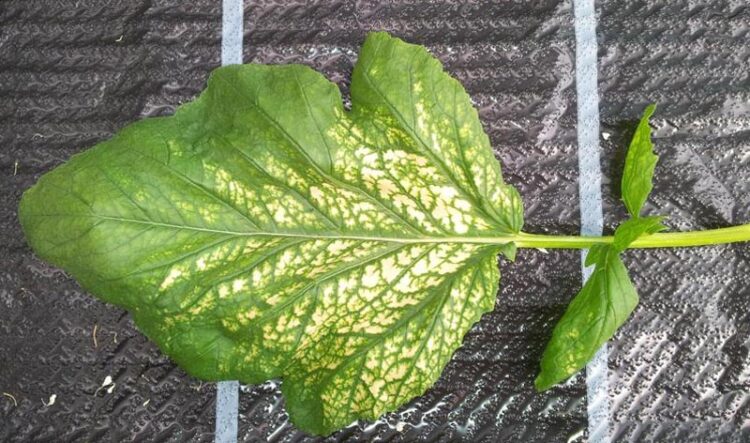How Air Pollution Harms Pollination

A wild mustard leaf damaged by ozone showing necrotic spots. A healthy leaf would be entirely green.
(c) Laura Duque / University of Würzburg
Insect pollination is vital for many plants. Air pollution caused by humans can disrupt this sensitive process. This is shown in a review article written at the University of Würzburg.
Pollination, i.e. the transfer of pollen grains from the male to the female organs, is an essential part of reproduction for the majority of plants. For many of these plants, this transfer is carried out by insects in search of food – this is known as insect pollination.
The impact of humans on the environment extends to pollination and pollinators and can have lasting effects on these sensitive relationships.
The Chair of Animal Ecology and Tropical Biology at Julius-Maximilians-Universität Würzburg (JMU) is investigating precisely such effects on our ecosystems. Dr. Laura Duque and Professor Ingolf Steffan-Dewenter have now summarized the latest research findings on how air pollutants – in particular ozone, diesel exhaust and particulate matter – could endanger insect pollination in a review article.
The article was published in the journal Frontiers in Ecology and the Environment.
Numerous Potential Problems
“Our article shows that air pollution can pose many problems for pollinators and plants,” says Laura Duque. “Plants could change the timing of their flowering or the insects could no longer be attracted to the flowers.”
Polluted air can also have negative effects on the orientation of pollinators, reduce the quality of pollen, or cause fundamental changes in the composition of plant and insect communities.
“Further research on the effects of air pollutants on insect pollination is important to identify the interactions between plants and pollinators that are most vulnerable to air pollution,” explains Laura Duque.
Insect Pollination and Humans
Insect-pollinated plants also include most cultivated plants. For some of them – such as coffee, strawberries, or rapeseed – a lack of pollination by insects would lead to enormous crop losses.
“With this article, we want to draw attention to the risk of air pollution to insect pollination and to the importance of taking appropriate protective measures,” says the biologist.
In addition to its influence on the relationships between plants and pollinators, air pollution also affects the interactions of plants with other organisms. In a planned project, Laura Duque wants to investigate how ozone pollution affects the pollination and predation of a specific group of insects: predatory hoverflies.
“These hoverflies are very interesting because they pollinate plants as adults, but feed on aphids in the larval stage and can thus reduce aphid populations.” Aphids, in turn, are well-known plant pests.
Originalpublikation:
Duque, Laura and Steffan-Dewenter, Ingolf: Air pollution: a threat to insect pollination. Frontiers in Ecology and the Environment. January 9th 2024, doi: doi:10.1002/fee.2701
Media Contact
All latest news from the category: Ecology, The Environment and Conservation
This complex theme deals primarily with interactions between organisms and the environmental factors that impact them, but to a greater extent between individual inanimate environmental factors.
innovations-report offers informative reports and articles on topics such as climate protection, landscape conservation, ecological systems, wildlife and nature parks and ecosystem efficiency and balance.
Newest articles

A ‘language’ for ML models to predict nanopore properties
A large number of 2D materials like graphene can have nanopores – small holes formed by missing atoms through which foreign substances can pass. The properties of these nanopores dictate many…

Clinically validated, wearable ultrasound patch
… for continuous blood pressure monitoring. A team of researchers at the University of California San Diego has developed a new and improved wearable ultrasound patch for continuous and noninvasive…

A new puzzle piece for string theory research
Dr. Ksenia Fedosova from the Cluster of Excellence Mathematics Münster, along with an international research team, has proven a conjecture in string theory that physicists had proposed regarding certain equations….



